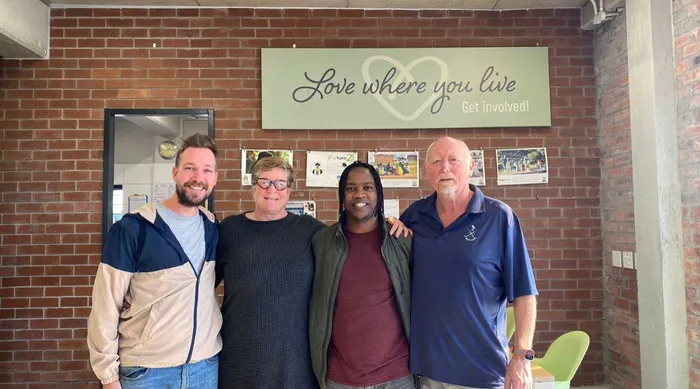‘Hand Up, Not Handout’ initiative launched in Ward 71

The new Hand Up, Not Handout initiative in Ward 71 offers sustainable support to people experiencing homelessness through referrals, rehabilitation, and job training. From left: CHS Life Centre’s Matt Ash, ward councillor Carolynne Franklin, Ubomi Trust’s Thobelani Mbala, and community member Andy Wingreen.
Image: Supplied
A new initiative aimed at offering sustainable support to people experiencing homelessness was officially launched at the end of May at the Kirstenhof Community Market.
The Hand Up, Not Handout campaign is a collaboration between the CHS Lifestyle Centre and communities across Ward 71.
It encourages residents to move away from giving money or food directly to people at traffic lights or doorsteps, and instead supports a structured system that connects individuals with lasting support.
At the heart of the initiative is a community-led approach offering access to shelter, job training, reintegration services, and rehabilitation.
Support begins at the CHS Life Centre, which offers immediate food relief during weekdays between 8.30am and 3.30pm. On Mondays and Thursdays from 9am to 11.30am, individuals can access showers, clothing where needed, and a snack.
During this time, people are also interviewed and referred to organisations like U-Turn for longer-term care.
Those who do not accept the referral are not eligible for further assistance until they agree to follow the process.
Community development worker at Ubomi Trust, Thobelani Mbala, said the initiative benefits both those asking for help and the broader community.
“As a community member, you want to make sure your resources aren’t misused or enabling harmful behaviour—you want to see them making a lasting difference in someone’s life,” he said.
“That’s why this initiative exists: to bring dignity to those in need, while ensuring accountability to those who give.”
U-Turn’s Muizenberg Service Centre plays a key role in the programme.
Centre manager Gavin Wessels said their support model focuses on what he called “an effective life change pathway,” which includes three stages: change readiness, rehab support, and work readiness.
“Our focus is holistic,” said Mr Wessels, “helping clients navigate shelter placements, family reunification, and referral to services like rehab and mental health support.”
Clients earn Mi-Change vouchers, which they can redeem for meals, showers, or clothing at the Muizenberg centre. Mr Wessels said they have already seen success stories.
“Some of our clients now work in the open labour market, some even for U-Turn itself.”
Ward 71 councillor Carolynne Franklin said the initiative is a vital step towards breaking the cycle of poverty and homelessness.
“This is incredibly important for a community such as Kirstenhof—and in fact, all eight suburbs in Ward 71,” she said.
“We’ve realised over many years that the gap between the haves and the have-nots is growing. Giving handouts at the door, at traffic lights, or on bin day may feel good in the moment, but it’s not a sustainable solution.”
She said the goal is to offer meaningful opportunities to those in need.
“It’s about helping people enrol in programmes that make a real difference—uplifting them beyond just a cup of coffee or a sandwich.”
Ms Franklin also emphasised the need for long-term community support to keep the initiative going.
“The kind of support that is most crucial is obviously financial, but also just spreading the word organically,” she said.
“Helping through proper channels—rather than handing over a loaf of bread or a jacket—is what truly helps.
“To grow this outreach to another level, we need sponsorship for leaflet printing, financial donations, and occasional help with logistics. But right now, printing support is one of our immediate needs.”
Residents can support the initiative in several ways, including donating food relief packs, sponsoring showers or transport, or helping to fund job training programmes.
U-Turn vouchers can also be purchased to refer individuals to the Muizenberg Service Centre for structured support.
Related Topics: